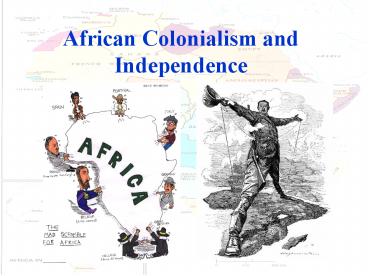African Colonialism and Independence - PowerPoint PPT Presentation
1 / 20
Title:
African Colonialism and Independence
Description:
European countries quickly tried to take pieces of Africa. ... Prior to WWII, Egypt, Ethiopia, Liberia, and South Africa were independent. French Colonies ... – PowerPoint PPT presentation
Number of Views:2253
Avg rating:3.0/5.0
Title: African Colonialism and Independence
1
African Colonialism and Independence
2
Africa in 1880 Pre-Colonization
3
1.How did Europeans gain access to Africas
Resources?
- European countries quickly tried to take pieces
of Africa. - Berlin Conference 1884 Otto von Bismarck
(Germany) brought together the leaders of
Belgium, Britain, France, Italy, Portugal and
Spain. - Ground rules were set up for colonization.
- This is when the slave trade ends!
- Colonies were established!
4
Colonization
- European countries ruled African lands until the
late 1900s. This is called IMPERIALISM!! - Positives Built roads, schools, hospitals,
technology - Negatives Took power from traditional leaders,
ruled as dictators, took away cultural traditions
in place of European ways!
5
African Colonies
6
1913- Percentages of Africa Owned by European
Countries
7
2. What happened in Africa after WWII?
- Most independence movements began after WWII.
- Prior to WWII, Egypt, Ethiopia, Liberia, and
South Africa were independent.
8
French Colonies
- Fighting in French colonies prompted French
leader Charles de Gaulle to grant independence. - Most French colonies became independent in 1960.
9
British Colonies
- Great Britain freed its colonies little by
little. - They did not believe in giving them independence
as a group (like France)
10
Portugals Colonies
- Portugal refused to give its 5 colonies
independence. - Independence did not come until there was
political change in Portugal in 1974.
11
3. What year marked the independence of all
African countries?
- By 1974, all African countries had gained
independence from their European owners.
12
4. What did Kwame Nkrumah want after independence?
- Kwame Nkrumah was a leader in the African
independence movement who later became the leader
of Ghana. He pushed for all Africans to work
together and unite. He was pushing for
pan-Africanism.
13
Pan-Africanism
- Based on uniting all Africans in the fight for
freedom from oppression. - Focuses on the importance of African ethnicity
and heritage. - Goals
- Unify Africans from around the globe
- Gain political power
- Belief in oneself
14
5. What are three influences over Africa?
- Three influences over Africa are
- Traditional African Cultures
- European Cultures
- Islam
15
6. What are the main ethnic groups in Nigeria,
and where do they live?
- The main ethnic groups in Nigeria are the Hausa
and Fulani, Yoruba, and the Igbo. Some of the
people in these ethnic groups still live in
traditional villages, others live in the cities.
16
7. How did colonization and the creation of
borders affect ethnic groups in a negative way?
- The Europeans set up borders where they wanted,
not taking into consideration the African ethnic
groups that lived there. - This split up ethnic groups and forced ethnic
groups that did not like each other to live
together. - This caused a lot of the wars we see in Africa
today.
17
(No Transcript)
18
Issues that came with Independence
- A few methods of rule were promoted
- Democracy (rule by the people)
- Socialism (group rather than individual)
- Pan-Africanism/Pan-Arabism (unity amongst ethnic
groups) - None of these movements were successful!
19
Issues Continued..
- Loss of culture
- Loss of development- Africans were never given
the chance to develop their talents. - Few educated Africans
- Inefficient transportation and healthcare
- No more European support
- Trade with countries outside of Europe was
virtually non-existent.
20
Issues Continued
- Country boundaries mixed ethnic groups that did
not get along. - This resulted in civil wars all over Africa
- Governments under colonialism provided a negative
influence for independent countries. - Most governments were based on dictatorships
- There was a lot of corruption
- Leaders made poor decisions because of little
knowledge of politics and leadership.































